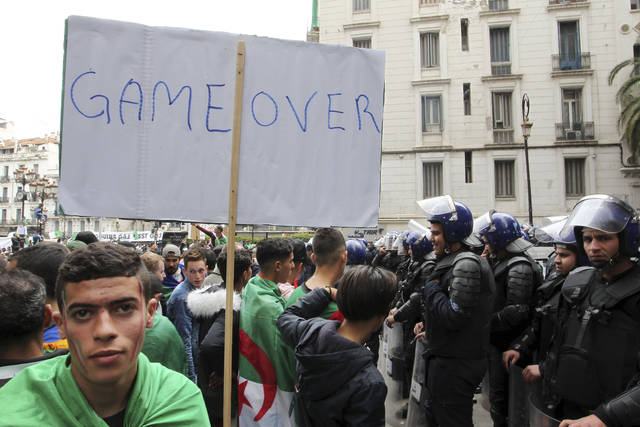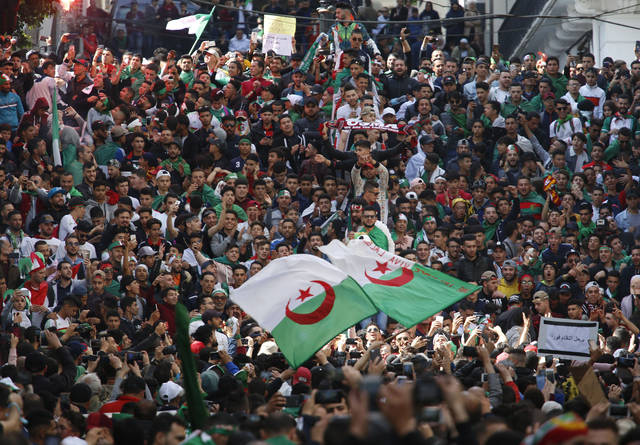ALGIERS, Algeria — Masses of Algerians whose pro-democracy movement forced out longtime President Abdelaziz Bouteflika sang and celebrated their victory Friday — and demanded that other top figures leave too.
Huge crowds surged through Algiers boulevards and marched toward the central post office, key symbol of a peaceful movement that has upended this energy-rich North African country in just weeks.
The crowd appeared the largest yet over seven straight Fridays of protests against a power structure seen as corrupt and repressive, according to an Associated Press reporter who has covered each one.
Despite being crammed shoulder to shoulder at some points in the hours-long demonstration, protesters remained good-spirited, with palpable joy at Bouteflika’s resignation.
It was their first protest since Bouteflika resigned this week under pressure from protesters and the powerful army. Bouteflika, 82 and ailing since a 2013 stroke, had been president since 1999 .
“Game Over” read some signs, or “The Streets Won’t be Silenced!”
Until an interim leader is named, no one is technically in charge of this country that’s a key player in the fight against terrorism and important source of Europe’s gas and oil .
Security was higher than usual at Friday’s protest, with roadblocks preventing buses of protesters from entering the capital. One group said they walked 20 kilometers after their bus was stopped at a roadblock from the Kabylie region east of Algiers.
But the crowds kept coming, including people from around Africa’s biggest country.
“It’s a little victory, but others should leave too,” said Salim Mehdi, a 40-year-old protester from the town of Bouira. Mehdi still lives with his parents and hasn’t married because he’s never found a solid job — and one reason he’s protesting is the limited economic opportunity for those outside the political elite.
However, he said he’s mainly protesting to show his frustration at a “corrupt, rotten system” where the same faces have been in charge for too long.
The protesters now want the departure of the men who head Algeria’s three branches of power: the prime minister, the upper house of parliament’s chief and the president of the constitutional court.
Some brandished signs calling for the exit of “the three Bs” — Prime Minister Noureddine Bedoui, Constitutional Council President Tayeb Belaiz, and upper house of parliament president Abdelkader Bensalah.
With the president gone, Bensalah — a Bouteflika ally — is expected to take over as interim leader while Algeria organizes elections. But first both houses of parliament must convene to appoint him, expected sometime next week.
It’s unclear what would happen if “the three Bs” were really to leave. The movement hasn’t coalesced around a single alternative candidate or plan to govern Algeria.
Some of Friday’s protesters suggested appointing a government of technocrats — not including any of the current political leadership — while new elections are organized.
Under Friday’s spring sun, protesters dangled banners from balconies and roofs. Police stood nearby, watching but not intervening.
Parents carried babies in slings and schoolchildren on shoulders. Protesters cleared the way in tightly packed streets for people in wheelchairs. Algerian flags were used as capes, bandanas and belts — the unifying symbol of a movement with no single political view.
“For the first time, I don’t feel like leaving my Algeria,” read a sign held by one protester. The movement has been driven by Algeria’s youth, many of whom leave for Europe to study or seek work.
Protests were also held around the country, from Tamanrasset and oil-rich Ouargla deep in the Sahara to the Mediterranean port city of Skikda, according to website TSA.
The military chief of staff, Ahmed Gaid Salah, played a key role in pushing Bouteflika toward the door and is considered the guarantor of Algeria’s security. But many protesters disagreed with his strategy and are mixed about what role he should play in the political transition.
Among posters at Friday’s demonstration was one reading: “No to a transition imposed by the army.”
The head of Algeria’s intelligence service, Athmane Tartag, quietly submitted his resignation after Bouteflika’s departure, a security official told The Associated Press. The official was not authorized to be publicly named. Algerian news reports said the intelligence service, DSS, will now report to the Defense Ministry instead of the president’s office.
———
Charlton reported from Paris.



